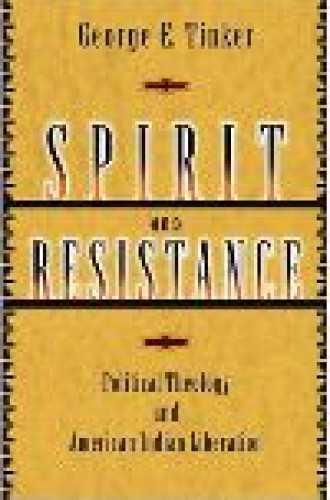Spirit and Resistance: Political Theology and American Indian Liberation
George Tinker brings a distinctive voice to the conversation on American Indians and Christianity and specifically the debate over whether one can be authentically Indian and Christian at the same time. He also introduces the concept of cultural competency as a test for those who claim an American Indian identity, using the term “thin-blood” for individuals who have a small proportion of American Indian blood but whose cultural competency may qualify them as more Indian than those with a higher proportion of Indian blood.
As Tinker points out, the whole issue of “blood quantum” has more to do with culture than with biological descent; it is the colonial system—that is, the U.S. government—that has used blood quantum in the biological sense as a criterion for being Indian. Tinker consistently attacks this colonialism, in part by refusing to capitalize words for national governments and religions, and he argues strongly against what he sees as Indians’ acquiescence to colonial policies.
U.S. government efforts to promote economic development in Indian communities are Tinker’s primary target. Such development, he argues, emphasizes individual enterprise over community. He uses the term “mal-development” to characterize the effects of this policy as destructive to values of community responsibility.
Tinker is acutely aware of the nuances of language and knows that high-quality writing, coupled with a command of biblical scholarship, gives a book intellectual power as well as political weight. He discusses the translation of the biblical term basileia as the “kingdom of God” in the context of political power, maintaining that the term has a much different connotation for American Indians than it has for Christians. Christianity, he argues, is a religion in which the kingdom of God is to be achieved in a historical sense, whereas American Indians find meaning in their connection to particular places. Kingdoms and hierarchy are historical constructs in a European context; Tinker interprets basileia as a place: the place of creation, which for Indians refers to the places that are the source of their identity.
Although liberation theologies have presented Christ as liberator from colonial oppression for indigenous people throughout the world, Tinker critiques liberationists’ Marxist stance. He argues that Marxism subsumes the distinctive political and social identity of American Indians into the classless Marxist society. Rather than liberating Indian nations, liberation theology reduces Indian individuals to nonpersons.
Tinker’s attention to the uses and nuances of language sharpens the issues in the debate over whether one can be both authentically Indian and Christian. He introduces and explicates new terms for the dialogue and offers concise critiques of government economic-development policies and of Christian idealism in liberation theology. Scholars in the field of contemporary American Indian religious thought will find much to respond to in Tinker’s book.





